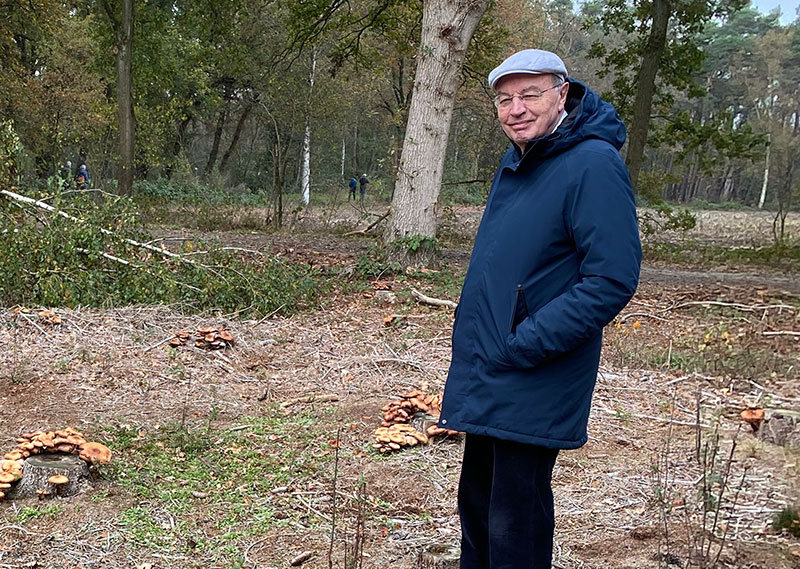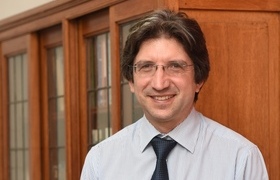Emeritus Professor Jean Cleymans: 1944–2021
22 February 2021 | Written by Professor Andy Buffler. Photos Supplied. Read time 7 min.
The news on 22 February 2021 of the accidental death of Emeritus Professor Jean Cleymans – from the University of Cape Town’s (UCT) Department of Physics – at his home in Turnhout, Belgium, came both as a personal shock to many and as a tragedy for South African science.
Jean Willy André Cleymans (JWAC to his colleagues) was born on 5 August 1944 in Turnhout, Belgium, and went on to receive his PhD in physics at the Université catholique de Louvain, followed by a postdoctoral fellowship (“habilitation”) in theoretical and condensed matter physics at the Universität Bielefeld in Germany, where he remained until 1983. He was invited by Professor Johann Rafelski to visit UCT in 1984, who recalls that “Jean gave a very convincing colloquium filled with nice jokes about language and life, and many people liked him.” Jean was soon thereafter appointed as a senior lecturer in physics in 1986 and then quickly advanced to full professor by 1989, a position he held until his retirement in 2009. He served as the head of the Department of Physics at UCT between 2002 and 2004, and after his retirement continued his work in the department as emeritus professor and senior scholar.
As a theoretical physicist, Jean Cleymans worked for more than half a century on quantum chromodynamics (QCD), the theory of the strong nuclear force of nature. Jean initially focused on the fundamental aspects of QCD and the properties of quarks, the elementary particles of this theory. Normally confined to hadrons, such as protons or neutrons, it was postulated that quarks can be liberated when heated to 100 000 times the temperature at the centre of the sun and compressed to 20 times the density of nuclear matter. Intrigued by this new state of matter, called the quark–gluon plasma (QGP), Jean spearheaded the development of a statistical thermal model that predicts the abundance of particles in the QGP with astonishing accuracy.

These conditions are studied experimentally by recreating a confined environment of the early universe at particle-accelerator centres, where protons and other heavier particles collide at immensely high energies. The particles created in these collisions are observed in modern experiments using huge and enormously complex detectors, such as those installed at the Large Hadron Collider (LHC) at the European Organization for Nuclear Research (CERN) in Geneva. When in early 2000 CERN publicly announced evidence had been found for this new state of matter, Jean’s work and the remarkable agreement with experimental data was a cornerstone of the scientific argument. Dr Tom Dietel, a colleague of Jean’s at UCT, emphasised that, “In 2001 Jean joined the ALICE collaboration at CERN, laying the foundation for the South African involvement in CERN’s Large Hadron Collider.”
As a long-time member of the ALICE collaboration at CERN, Jean worked over many decades to advance the opportunities for both established researchers and postgraduates to make impactful contributions at CERN. He was a founding member in 2007 of the SA-CERN consortium, which to this day provides funding for South African researchers to have access to CERN experiments and facilities, and he was first chairman of the programme until quite recently.
Professor Zeblon Vilakazi, the vice-chancellor of the University of the Witwatersrand (Wits), recalled: “We started the SA-ALICE programme as soon as UCT was accepted by the ALICE collaboration at a conference in Goa in 2001. The main physics objective (qualification task) was to build the high-level trigger – this was the first group on the African continent to launch such an initiative from the experimental side. Following the successful delivery of the trigger in 2008 (for the LHC commissioning) the group grew into a larger SA-CERN consortium (which Jean chaired) that included UCT, Wits, iThemba LABS, Rhodes, UKZN and UJ.”
Professor Cleymans authored or co-authored more than 300 refereed articles on theoretical physics in journals such as the European Physical Journal, Physical Review and Physics Letters, which have attracted over 20 000 citations. His h-index, for what this is worth, was well into the 90s, but more significant was the duration of his National Research Foundation A-rating, which was first awarded in 1985 and continually re-awarded, most recently only a few weeks ago.
As a teacher, Jean stood out as being caring and generous to the students in his classes, and he particularly excelled at the higher levels. His course on statistical physics at honours level is remembered as a classic by all students who sat for it, and also by younger lecturers who benefited from access to his lecture notes. However, it was at the postgraduate level where Jean made the greatest impact: he supervised 24 MSc students and 17 PhD students (the last administered only a few weeks ago).
Furthermore, most of his previous students are making significant contributions in science and society today, with more than half active in academia, including four with permanent positions at UCT. One of his old postgraduates and long-time collaborators Professor Azwinndini Muronga, now the dean of Science at Nelson Mandela University, remembers Jean as having “qualities of excellence and humanising pedagogy – excellence with purpose”.
Jean was recognised through many awards and prizes over the years, most notably a Humboldt Research Award (1999), given by the Alexander von Humboldt Foundation in Germany, and a medal of honour for outstanding contributions to the development of the Joint Institute for Nuclear Research (2016). He was a member of many national and international advisory panels and committees and served on several senior committees at UCT, including the University Research Committee.
On a personal level, I valued Jean’s gentle manner. He would walk into my office with a “Hi, hello” and would not dive into business without a collegial check on my well-being. Issues which he could not immediately see a solution to were punctuated with an apologetic “Oh, boy” and a mournful shake of the head. Jean wanted the best for everyone he interacted with, and his tendency to withdraw from conflictual situations was sometimes misinterpreted by those who held opinions contrary to his own.
John Ellis, the Clerk Maxwell Professor of Theoretical Physics at King’s College London, wrote: “Jean was truly a great guy, personally as well as professionally, who strove ceaselessly to improve the world. He will indeed be sorely missed by all who knew him and appreciated his personality and principles.”
On behalf of UCT, I thank his wife, Ria, and daughters, Sylvie and Silke, for sharing Jean so generously with us as his colleagues and with all the students who had the privilege of benefiting from his caring and skilful guidance. Jean’s legacy will not only be evidenced by the continuation of UCT’s ongoing investment in high-energy physics, but also by the countless postgraduates who will follow and benefit from his own efforts to grow South Africa’s profile in one of the largest scientific enterprises on the planet.
Andy Buffler
Professor and HoD: UCT Physics
28 February 2021
 This work is licensed under a Creative Commons Attribution-NoDerivatives 4.0 International License.
This work is licensed under a Creative Commons Attribution-NoDerivatives 4.0 International License.
Please view the republishing articles page for more information.









